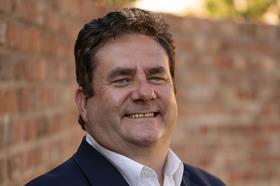On 29 June, colleagues and our respective LGBTQ+ member networks at the Law Society and Bar Council will be marching at London Pride.

Social mobility is a key focus of my presidential year plan.
To mark Global Pride Month which starts in June, I thought it would be appropriate for me to acknowledge social mobility and its place during the month.
While I cannot speak from lived experience, I am mindful of the discrimination and inequality LGBTQ+ lawyers can face in the workplace and the work that continues to ensure everyone can be their authentic self at work.
A golden thread through equality, diversity and inclusion (EDI) initiatives is the notion of 'intersectionality', first coined by American lawyer Kimberlé Williams Crenshaw in 1989 (and yet only added to Merriam-Webster’s dictionary in 2016).
Intersectionality acknowledges that those with multiple protected characteristics which each render a degree of disadvantage are likely to face greater, compounding difficulty than those who have only one.
This commonsense proposition can post thorny challenges, with employment lawyers at the coal face of this when attempting to identify the characteristics of their claimant’s 'comparator.'
The concept of intersectionality has also been criticised for its potential for factionalism. Regardless of your view on the merits of these arguments, such language has the potential to alienate people who would otherwise be supporters of social justice for fear that they lack sufficient understanding of the jargon.
Social mobility
Instead of discussing the LGBTQ+ experience of identity formation and coming out, I want to highlight the significance of being LGBTQ+ as an additional layer on top of social mobility.
Despite not being a protected characteristic within the meaning of the Equality Act 2010, it is undeniable that socio-economic background continues to have an effect on an individual’s career prospects.
The Solicitors Regulation Authority’s diversity data indicates that, whilst there is some upward mobility for those from intermediate socio-economic backgrounds, between 2015 and 2023 the percentage of lawyers from lower socio-economic backgrounds fell from 21% to 18%. 25% of partners attended an independent or fee-paying school.
Two of the crucial components of any successful application for a junior legal role are academics and work experience. However, statistics consistently show that LGBTQ+ people face distinct challenges in these areas, adversely affecting their ability to fulfil their potential. These facts, a selection of which are below, make for sobering reading:
- LGBT+ pupils are twice as likely to have been bullied than their non-LGBT+ peers, with 42% of research respondents having been bullied in the previous year.
- The UK government’s National LGBT Survey in 2018 found that 24% of respondents had accessed mental health services in the preceding 12 months.
- In 2017, a YouGov study found that one in ten LGBT people (10%) who were looking for a house or flat to rent or buy in the previous year were discriminated against because of their sexual orientation and/or gender identity.
- 34% of employers are 'less likely' to hire a transgender person, with only 33% of employers in the legal sector open to the idea.
These points merely scratch the surface of the complex, often-systemic adversity that LGBTQ+ people face. In the legal sector, people have adverse mental health because the environment is not inclusive or workplaces do not proactively seek to accommodate LGBTQ+ identities.
The Law Society’s Pride in the Law report found that 37% of LGBT+ respondents experienced homophobia, biphobia or transphobia in the workplace, 37% of lesbian/gay women and 36% of gay men and 32% of bisexual lawyers experience negative behaviours.
Respondents said this treatment had a longer-term impact on their career progression and mental health.
The report found that the ability to ‘bring your whole self to work’ is linked to better mental health.
It is clear that these threats to 'basic' needs in Maslow’s hierarchy prevent an individual from self-actualising. Lost opportunities along the way – perhaps lack of academic achievement due to bullying at school, which in turn means a student does not qualify for a work experience placement at a law firm – make an already difficult task Herculean for an LGBTQ+ person seeking to advance beyond their socio-economic background.
Instead of seeking to categorise people into buckets of characteristics and from this attempt to deduce their experiences, I suggest it is time for us to be bold.
We should have the humility to acknowledge our ignorance of LGBTQ+ communities’ experiences, take the time to educate ourselves by reading content from people within these groups and then to ask individuals in a sensitive manner what they would appreciate by way of action from allies to level the playing field.
Whilst these conversations can sometimes be uncomfortable (and perhaps better conducted discreetly via diversity consultants in some cases), the more we practise the easier they become. The profession will be all the richer for it.
Nick Emmerson, president of the Law Society of England and Wales, with contribution from the Law Society’s LGBTQ+ Solicitors Network






























